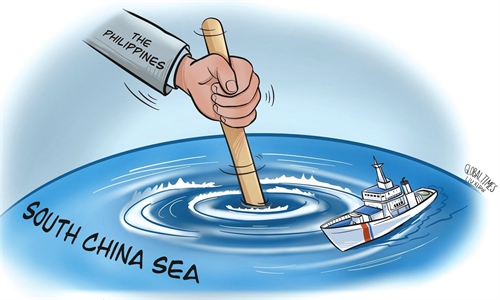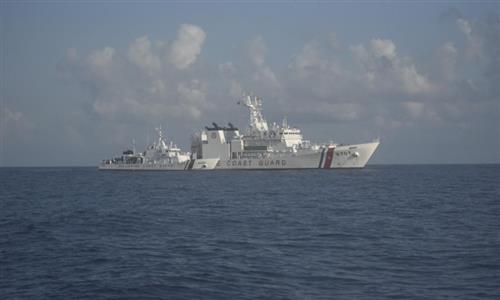Exclusive: Philippine accusation of ‘Chinese vessel hitting Filipino ship with laser’ completely unfounded, says source

GT Exclusive
The Philippines' recent claim regarding a "Chinese vessel hitting a Philippine Bureau of Fisheries and Aquatic Resources (BFAR) ship with a high-intensity laser" in the South China Sea is completely unfounded, a source close to the matter told the Global Times on Thursday. In reality, the China Coast Guard (CCG) vessel was merely using a searchlight to assess the maritime situation during nighttime law enforcement operations, and did not employ any "laser weapons."
The relevant authorities and some media in the Philippines have once again stirred up the "laser harassment" following similar claims made in February 2023. This reflects a repetitive tactic employed by the Philippines at a cognitive war level, highlighting that Manila's "persecution complex" has reached an alarming degree, Ding Duo, a deputy director of the Institute of Maritime Law and Policy at the China Institute for South China Sea Studies, told the Global Times on Thursday.
A Philippine government report said that "an unidentified Chinese vessel struck a Bureau of Fisheries and Aquatic Resources ship with a 'high-intensity laser'" on December 2 in the vicinity of Banyue Jiao in the South China Sea, while the Philippine BRP Datu Tamblot was en route to Zhongye Dao, according to Philippine media Inquirer on December 9.
The Philippine side said that the "Chinese ship used the laser at BRP Datu Tamblot from the shoal's east direction six times at an interval of five minutes," and "the high-intensity laser was described to be color red, albeit appeared violet in photos, and [was] painful to the eyes," the report noted.
After reviewing the video footage released by the Philippine side, the source close to the matter told the Global Times that the claim of "Chinese vessels using laser assaults" is completely unfounded. In reality, this was merely a brief use of onboard searchlights by Chinese law enforcement vessels to assess the maritime situation in the dark, identify unknown targets and gather evidence. The use of searchlights is a standard operation for ensuring navigational safety during nighttime voyages.
Ding said that the actions taken by CCG in the South China Sea are normal activities aimed at safeguarding its territorial sovereignty and maritime rights. The Philippines' portrayal of China's sovereignty maintenance efforts as "maritime bullying" is a cognitive warfare strategy employed in the domestic public opinion sphere and international community.
In February 2023, the Philippine Coast Guard falsely accused CCG vessels of "firing lasers" at a Philippine ship near China's Ren'ai Jiao while the Philippine ship was engaged in a "rotation and resupply mission" to its illegally grounded military vessel at Ren'ai Jiao.
In response, a Chinese Foreign Ministry spokesperson clarified on February 15, 2023 that on February 6, a Philippine Coast Guard vessel intruded into the waters adjacent to the Ren'ai Jiao without China's permission. The CCG ship was compelled to respond in accordance with law and warned the vessel to leave the area. During that process, the CCG ship used hand-held laser speed detector and hand-held greenlight pointer to measure the distance and speed of the Philippine vessel and signal directions to ensure navigation safety.
"We need to highlight the fact that the CCG ship did not direct lasers at the Philippine crew, and the hand-held equipment does not inflict damage on anything or anyone on the vessel. The Philippine side's allegation does not reflect the truth," the spokesperson said.
Ding stated that "the Philippines is resorting to familiar tactics. The script remains the same, and the lines are unchanged. Although the Philippine Coast Guard is putting on a vigorous performance, whether in maritime provocations or false narratives, they have reached the limits of their capabilities."
"The Philippines is still deluding itself into thinking that China is using some advanced weapons, when in reality it's just a big flashlight used in routine law enforcement operations. Honestly, from a technical standpoint, lasers and searchlights are easy to distinguish. The Philippines is just using these excuses to play the victim on the international stage," Ding said.
As the rightful owner of the islands in the South China Sea, China has strong grounds for its comprehensive measures to protect its rights. There is no obligation to explain every action taken in the defense of maritime rights to the outside world, Ding said.
However, in response to certain individuals from the Philippines who consistently distort the truth and propagate falsehoods regarding South China Sea issues, China will continue to take proactive steps to clarify the historical context and factual realities of the situation. The Philippines' attempts to transform rumors into political, legal and moral pressure on China, in an effort to extract concessions, will ultimately be futile, Ding said.




